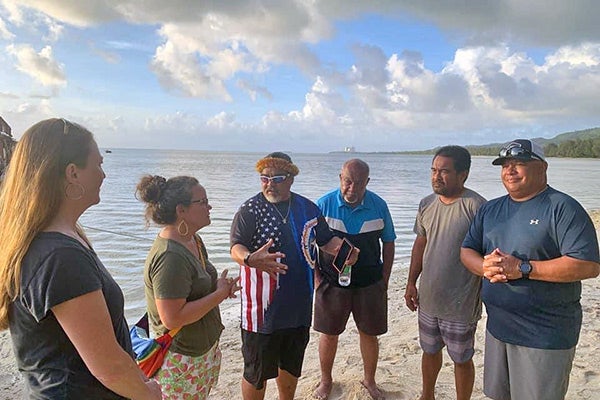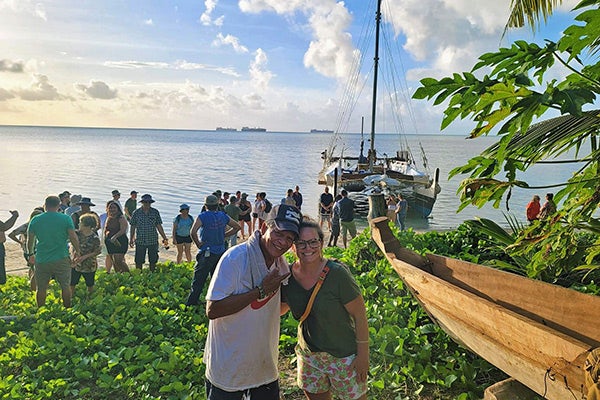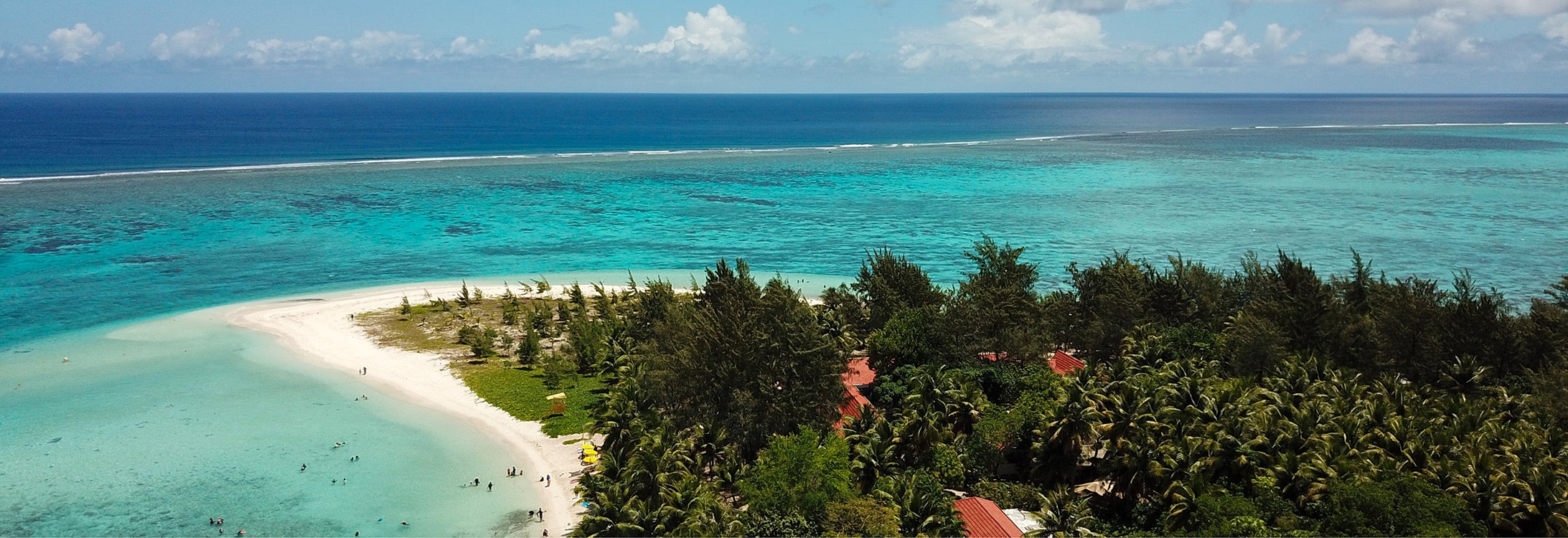Previous work with islanders opens door for researcher to help protect heritage
The turquoise waters surrounding the small island chain that includes Guam and the Northern Mariana Islands hold opportunities for exploring future wind energy projects. But they also hold important archaeological and cultural heritage sites.
Dr. Jennifer McKinnon, professor of maritime studies in East Carolina University’s Department of History, is taking on a new research project that will incorporate the knowledge and feedback of Indigenous Pacific Islanders in developing guidance for the preservation of maritime heritage ahead of potential future offshore energy developments. The Department of the Interior’s Bureau of Ocean and Energy Management (BOEM) awarded the project $599,377 in funding as part of a cooperative agreement.

McKinnon talks with cultural practitioners on the beach where traditional navigators launch their canoes. (Contributed photos)
McKinnon credits her unique position to embark on this research for BOEM to the connection and reputation she built with the community while conducting other work in the Pacific Island region over the past decade.
“My research is community-based – with, for and by the community. I’ve developed long-term personal and professional relationships that have allowed me to gain trust and help uphold their history and heritage,” McKinnon said.
McKinnon’s previous maritime archaeological work in the region included projects with the Defense POW/MIA Accounting Agency (DPAA) to locate American aircraft lost during the Battle of Saipan.
With this new project, McKinnon and her team will work to complete a database of all known and possible shipwrecks and other underwater heritage sites along the island chain. This effort will assist BOEM in its responsibility to identify potential maritime heritage in the Pacific that might be affected by future energy-related developments.
Currently, the Pacific Island region is heavily dependent on fossil fuels for energy and has developed strong renewable energy goals to reduce that dependency. McKinnon states that with the development of offshore renewable energy projects comes the potential for impacts to underwater and terrestrial archaeological, cultural and historical resources. The BOEM is required under federal statutes to consider how these types of properties may be affected by its activities.
“It is a proactive process that involves working with the Indigenous Pacific Islander communities to identify what they feel are significant traditional cultural properties to their islands. Engaging the community will help us develop best practices guidelines for reviewing and protecting maritime heritage that might be impacted during future development,” she said.
McKinnon said the team wants to document tangible heritage sites like shipwrecks, sunken aircraft, significant canoe landings or routes, Indigenous fish traps, locations related to origin stories, and other heritage related to the Pacific Islander connections to the sea.
“It could also include more intangible things like songs, dances, traditional fishing knowledge, viewsheds, stories, ceremonies, etc.,” she said.

McKinnon stands with master navigator Antonio “Tony” Piailug at the canoe hut where traditional canoes are built.
The team will engage with local experts and community members who will act as consultants. McKinnon expects the work to involve community meetings by the water where islanders help identify, map and chart the sites and properties they value. The consultive group will also identify protocols for appropriate future engagement regarding federal projects.
To lead this part of the research, she has partnered with Dr. Kristen Myers, chair of the Department of Sociology at ECU.
“Dr. Myers has significant experience and skills in focus group and ethnography and will be invaluable to running the community workshops and gatherings. Her research will be useful for understanding the multiple layers of historical narratives that have been part of the island chain’s past,” said McKinnon.
Myers agrees the focus groups are vital to the project and the relationship with the research community.
“Utilizing focus groups helps to decenter the researchers as ‘the Knowers’ and to re-center the Indigenous Pacific Islanders’ status as the keepers of historical and contemporary knowledge,” said Myers.
The research team includes doctoral and graduate students who will conduct archival and historical research in Hawaii, Washington D.C., New Orleans and other locations to develop a database of known and potential underwater heritage sites. They will also help with the island community workshops and gatherings.
“This will be an invaluable opportunity for ECU students to travel abroad and work with communities while gaining experience in conducting research,” Myers said.
McKinnon said Integrated Coastal Sciences doctoral student Madeline Roth will bring an interdisciplinary approach that allows the research to move beyond the nature-culture divide.
“For Pacific Islanders, natural resources are cultural resources,” said Roth.
“Many communities manage ecosystems and resources for the natural and cultural benefits they provide. In turn, communities also develop culturally based management frameworks that return care for these resources. This reciprocal relationship between people and place can be overlooked in some resource management approaches. Our project addresses the need for integrating communities and cultural values in federal decision making,” she said.
Along with the research side of the project, the team will initiate a K-12 educational program run by local educators to support island students in learning about the identified maritime cultural practices and properties. The findings from the research will be essential knowledge for the community to pass down to younger generations as they may one day be engaged by federal agencies to consult in heritage preservation discussions.
Dr. Sharon Paynter, acting chief research and engagement officer at ECU, said, “Our faculty researchers positively impact the world around us, and Dr. McKinnon’s work in the Mariana Islands is another way ECU’s Pirates make a difference. Through this project, students are engaged in transformative learning experiences that prepare them to enter the workforce successfully. This project also continues ECU’s commitment to serve the public in its focus on working with community members to enhance their well-being and preserve important cultural knowledge, practice and values.”
McKinnon notes the project is groundbreaking in that it will be the first project of its type in the western Pacific.
“Never before has a project spanned all of the Mariana Islands. This is the first comprehensive project to identify and develop best practices for protecting maritime heritage in the islands.” she said.
“Our work will be critical for the future of the region.”
